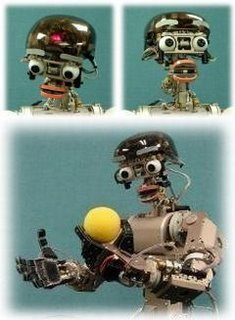Infanoid and Keepon
Professor Hideki Kozima of Japan's National Institute of Communications and Technology, NiCT, presented a paper at the Robotics for Society conference in Vancouver, Canada, on two robots designed for studying child development and interactions with robots.
The two robots, Infanoid and Keepon, interact with people through movement, emotional expressions and voice.
Infanoid is a small humanoid upper torso. Infanoid can gesture with his arms and hands, make facial expressions and repeat back what is spoken to him. His two eye-cameras allow him to 'pay attention' and make eye contact.
Keepon is much simpler, looking like not much more than a marshmallow peep, but still has enough motion to appear engaged with a human. Keepon is a small soft rubber creature with no arms. It can twist to focus its attention and rock or bob up and down to express delight.

The researchers found that children will interact with the robots. They found the at first the children are a little scared of the robots. then they start to explore by poking them or waving objects at them. Eventually the children begin playing with the robots in a closed-loop relationship. The robots were allowed to play with normally developing kids and autistic children.
They expect to be able to use the robots for a better understanding of social development of both humans and robots.
Using Robots for the Study of Human Social Development (PDF)
Infanoid Project (Robotic Platforms)
via Artificial Intelligence and Robotics
The two robots, Infanoid and Keepon, interact with people through movement, emotional expressions and voice.

Infanoid is a small humanoid upper torso. Infanoid can gesture with his arms and hands, make facial expressions and repeat back what is spoken to him. His two eye-cameras allow him to 'pay attention' and make eye contact.
Keepon is much simpler, looking like not much more than a marshmallow peep, but still has enough motion to appear engaged with a human. Keepon is a small soft rubber creature with no arms. It can twist to focus its attention and rock or bob up and down to express delight.

The researchers found that children will interact with the robots. They found the at first the children are a little scared of the robots. then they start to explore by poking them or waving objects at them. Eventually the children begin playing with the robots in a closed-loop relationship. The robots were allowed to play with normally developing kids and autistic children.
They expect to be able to use the robots for a better understanding of social development of both humans and robots.
Using Robots for the Study of Human Social Development (PDF)
Infanoid Project (Robotic Platforms)
via Artificial Intelligence and Robotics